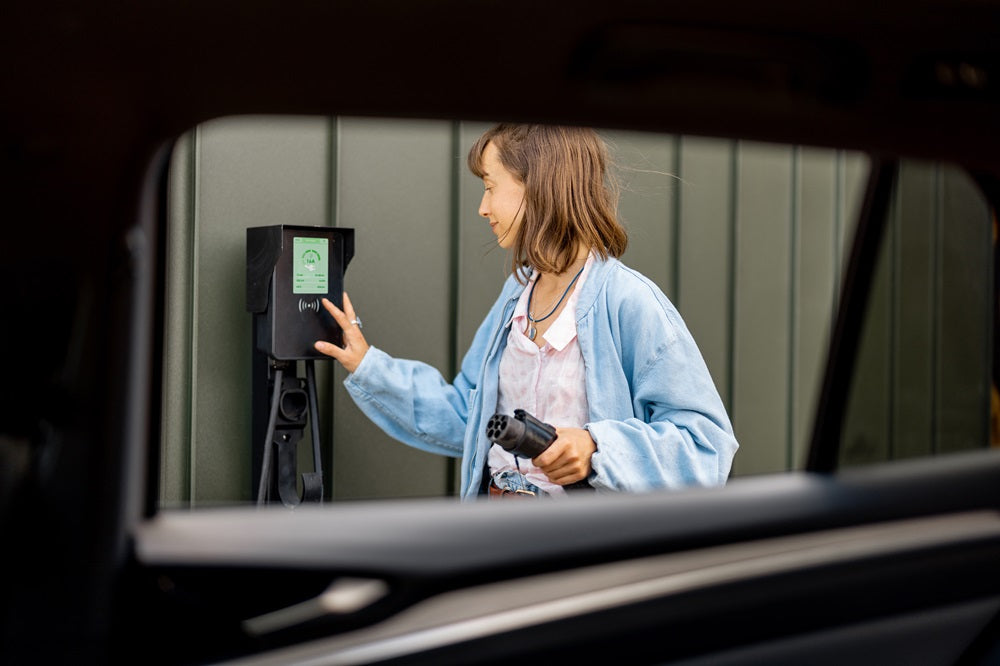
Can I Install an EV Charger Myself? Everything You Need to Know Before Getting Started
As the number of electric vehicle (EV) owners rises rapidly across the UK and Europe, the demand for home EV charging solutions is following closely behind. If you’ve recently bought an electric car or are planning to, one of the first questions you'll likely ask is: “Can I install an EV charger myself?”
The short answer is no — unless you are a certified electrician with specific experience in EV charger installations, doing it yourself is not recommended and can even be dangerous. But there’s a lot more you should know before making a decision. In this guide, we’ll break down why professional installation is essential, what the installation process looks like, cost factors, and how to make the most of government incentives.
Why You Shouldn’t Install an EV Charger Yourself
1. Electrical Safety Risks
Home EV chargers typically operate on high voltage (7kW to 22kW), which is far more powerful than a regular household socket. Improper installation could lead to serious risks such as:
-
Electric shocks
-
Short circuits
-
Fire hazards
-
Damage to your vehicle’s battery system
A trained installer ensures your charger is wired properly, grounded correctly, and tested according to safety standards.
2. Warranty and Insurance Void
Most EV charger manufacturers clearly state that DIY installations void the product warranty. Similarly, home insurance providers may reject claims related to electrical fires or damage if the charger wasn’t professionally installed and certified. If you want peace of mind, professional installation is non-negotiable.
3. Legal and Regulatory Compliance
In the UK, EV charger installations must comply with:
-
The IET Wiring Regulations (BS 7671)
-
Part P of the Building Regulations
-
OZEV grant scheme conditions (if applicable)
A certified installer will not only comply with all these regulations but will also issue a certificate of installation, which may be required for insurance purposes, future property sales, or grant applications.
What Is the EV Charger Installation Process?
Although it may sound technical, the installation process is usually straightforward when handled by professionals. Here's a step-by-step overview:
-
Pre-installation Site Survey
An installer assesses your electrical system, location of the fuse box, and your preferred charger placement. -
Choosing the Right Charger
Based on your vehicle type, usage habits, and whether you want smart features (like scheduled charging or app control), the installer recommends the most suitable unit. -
Electrical Upgrades (if required)
Older homes may need a consumer unit upgrade or additional cabling to safely handle the charger’s power draw. -
Physical Installation
The installer mounts the charger on your wall, routes the necessary wiring, and connects the system to your main fuse box. -
Testing and Certification
After installation, the charger is tested to confirm safe operation. You’ll also receive an Electrical Installation Certificate (EIC) or Building Regulations Compliance Certificate. -
Demonstration and Support
Many installers offer a quick walkthrough of how to use the charger, mobile app setup, and basic troubleshooting.
How Much Does EV Charger Installation Cost?
The cost of installing a home EV charger in the UK typically ranges from £300 to £1,500, depending on several factors:
| Factor | Impact on Cost |
|---|---|
| Distance from fuse box | Longer distances mean more cable and higher labour cost |
| Wall vs post-mounted installation | Posts may require groundwork, increasing cost |
| Charger power level (7kW vs 22kW) | Higher output requires more robust wiring |
| Smart vs basic charger | Smart chargers are more expensive to buy and set up |
| Property type (flat vs detached house) | Flats may require landlord consent and shared metering considerations |
Pro Tip: Get at least two to three quotes from OZEV-approved installers before committing.
Can I Get Financial Support for Installation?
Yes, the UK government offers several schemes to reduce the cost of EV charger installation:
-
OZEV EV Chargepoint Grant (for renters and flat owners)
Offers up to £350 towards the cost of installation. -
Workplace Charging Scheme (WCS)
Ideal for businesses, it offers up to £350 per socket for up to 40 sockets. -
Local Council Grants
Some councils offer top-up grants or free on-street installations. Always check with your local authority.
Make sure your installer is OZEV-approved, otherwise you won’t be eligible for these schemes.
What Should I Look for in an Installer?
Here are key qualities to prioritise when choosing an EV charger installation service:
Certified & Experienced
They must be qualified electricians registered with a competent person scheme (e.g., NICEIC, NAPIT) and ideally listed on the OZEV approved installer list.
EV-specific Knowledge
Not every electrician is familiar with the requirements of EV charger installation. Look for providers with a proven track record.
End-to-End Support
The best installers will help you:
-
Choose the right charger
-
Handle grant applications
-
Provide post-installation support and maintenance
Insurance & Warranty
Ensure both the workmanship and the hardware come with adequate warranty coverage.
Can I Use a Standard Plug Socket for Charging?
Technically, yes — but it's not recommended for regular use.
-
Slow charging: A 3-pin plug charges at 2.3kW and can take over 24 hours for a full charge.
-
Overheating risk: Prolonged use of household sockets for charging can cause overheating or fuse failures.
-
Not future-proof: As EV battery sizes grow, 3-pin plugs will become increasingly impractical.
A dedicated home charger is safer, faster, and more energy-efficient.
Final Thoughts: Invest in Safety and Convenience
While the idea of a DIY EV charger installation might seem like a way to save money, the risks and long-term implications far outweigh any short-term gains. With legal, safety, and financial reasons all pointing in the same direction, the smart choice is clear:
Always use a certified professional for EV charger installation.
Doing so not only ensures your home and car are safe but also opens doors to government incentives, warranty protection, and future-proofing your setup.
Energizer A-Rated Bulbs

Energizer S29628 A Rated LED Elite GLS E27 Filament 806lm 3.8W 2700K (Warm White)
Energizer S29628 A Rated LED Elite GLS E27 Filament 806lm 3.8W 2700K (Warm White) Energizer products are recognised as one of the most trusted and ...
View full details
Energizer S29628 A Rated LED Elite GLS E27 Filament 806lm 3.8W 2700K (Warm White)(12 Pack)
Energizer S29628 A Rated LED Elite GLS E27 Filament 806lm 3.8W 2700K (Warm White)(12 Pack) Energizer products are recognised as one of the most tru...
View full details
Energizer S29629 A Rated LED Elite GLS E27 Filament 806lm 3.8W 6500K (Daylight)
Energizer S29629 A Rated LED Elite GLS E27 Filament 806lm 3.8W 6500K (Daylight) Energizer products are recognised as one of the most trusted and hi...
View full details
Energizer S29629 A Rated LED Elite GLS E27 Filament 806lm 3.8W 6500K (Daylight)(12 Pack)
Energizer S29629 A Rated LED Elite GLS E27 Filament 806lm 3.8W 6500K (Daylight)(12 Pack) Energizer products are recognised as one of the most trust...
View full details
Energizer S29630 A Rated LED Elite GLS B22 Filament 806lm 3.8W 2700K (Warm White)
Energizer S29630 A Rated LED Elite GLS B22 Filament 806lm 3.8W 2700K (Warm White) Energizer products are recognised as one of the most trusted and ...
View full details
Energizer S29630 A Rated LED Elite GLS B22 Filament 806lm 3.8W 2700K (Warm White)(12 Pack)
Energizer S29630 A Rated LED Elite GLS B22 Filament 806lm 3.8W 2700K (Warm White)(12 Pack) Energizer products are recognised as one of the most tru...
View full details
Energizer S29631 A Rated LED Elite GLS B22 Filament 806lm 3.8W 6500K (Daylight)
Energizer S29631 A Rated LED Elite GLS B22 Filament 806lm 3.8W 6500K (Daylight) Energizer products are recognised as one of the most trusted and hi...
View full details
Energizer S29631 A Rated LED Elite GLS B22 Filament 806lm 3.8W 6500K (Daylight)(12 Pack)
Energizer S29631 A Rated LED Elite GLS B22 Filament 806lm 3.8W 6500K (Daylight)(12 Pack) Energizer products are recognised as one of the most trust...
View full details
Energizer S29632 A Rated LED Elite GLS E27 Filament 1521lm 7.2W 2700K (Warm White)
Energizer S29632 A Rated LED Elite GLS E27 Filament 1521lm 7.2W 2700K (Warm White) Energizer products are recognised as one of the most trusted and...
View full details
Energizer S29632 A Rated LED Elite GLS E27 Filament 1521lm 7.2W 2700K (Warm White)(12 Pack)
Energizer S29632 A Rated LED Elite GLS E27 Filament 1521lm 7.2W 2700K (Warm White)(12 Pack) Energizer products are recognised as one of the most tr...
View full details
Energizer S29633 A Rated LED Elite GLS E27 Filament 1521lm 7.2W 6500K (Daylight)
Energizer S29633 A Rated LED Elite GLS E27 Filament 1521lm 7.2W 6500K (Daylight) Energizer products are recognised as one of the most trusted and h...
View full details
Energizer S29633 A Rated LED Elite GLS E27 Filament 1521lm 7.2W 6500K (Daylight)(12 Pack)
Energizer S29633 A Rated LED Elite GLS E27 Filament 1521lm 7.2W 6500K (Daylight)(12 Pack) Energizer products are recognised as one of the most trus...
View full details
Energizer S29634 A Rated LED Elite GLS B22 Filament 1521lm 7.2W 2700K (Warm White)
Energizer S29634 A Rated LED Elite GLS B22 Filament 1521lm 7.2W 2700K (Warm White) Energizer products are recognised as one of the most trusted and...
View full details
Energizer S29634 A Rated LED Elite GLS B22 Filament 1521lm 7.2W 2700K (Warm White)(12 Pack)
Energizer S29634 A Rated LED Elite GLS B22 Filament 1521lm 7.2W 2700K (Warm White)(12 Pack) Energizer products are recognised as one of the most tr...
View full details
Energizer S29635 A Rated LED Elite GLS B22 Filament 1521lm 7.2W 6500K (Warm White)
Energizer S29635 A Rated LED Elite GLS B22 Filament 1521lm 7.2W 6500K (Warm White) Energizer products are recognised as one of the most trusted and...
View full details
Energizer S29635 A Rated LED Elite GLS B22 Filament 1521lm 7.2W 6500K (Warm White)(12 Pack)
Energizer S29635 A Rated LED Elite GLS B22 Filament 1521lm 7.2W 6500K (Warm White)(12 Pack) Energizer products are recognised as one of the most tr...
View full details
Energizer S29636 A Rated LED Elite Candle E27 Filament 470lm 2.2W 2700K (Warm White)
Energizer S29636 A Rated LED Elite Candle E27 Filament 470lm 2.2W 2700K (Warm White) Energizer products are recognised as one of the most trusted a...
View full details
Energizer S29636 A Rated LED Elite Candle E27 Filament 470lm 2.2W 2700K (Warm White)(12 Pack)
Energizer S29636 A Rated LED Elite Candle E27 Filament 470lm 2.2W 2700K (Warm White)(12 Pack) Energizer products are recognised as one of the most ...
View full details
Energizer S29637 A Rated LED Elite Candle E27 Filament 470lm 2.2W 6500K (Daylight)
Energizer S29637 A Rated LED Elite Candle E27 Filament 470lm 2.2W 6500K (Daylight) Energizer products are recognised as one of the most trusted and...
View full details
Energizer S29637 A Rated LED Elite Candle E27 Filament 470lm 2.2W 6500K (Daylight)(12 Pack)
Energizer S29637 A Rated LED Elite Candle E27 Filament 470lm 2.2W 6500K (Daylight)(12 Pack) Energizer products are recognised as one of the most tr...
View full details
Energizer S29638 A Rated LED Elite Candle B22 Filament 470lm 2.2W 2700K (Warm White)
Energizer S29638 A Rated LED Elite Candle B22 Filament 470lm 2.2W 2700K (Warm White) Energizer products are recognised as one of the most trusted a...
View full details
Energizer S29638 A Rated LED Elite Candle B22 Filament 470lm 2.2W 2700K (Warm White)(12 Pack)
Energizer S29638 A Rated LED Elite Candle B22 Filament 470lm 2.2W 2700K (Warm White)(12 Pack) Energizer products are recognised as one of the most ...
View full details
Energizer S29639 A Rated LED Elite Candle B22 Filament 470lm 2.2W 6500K (Daylight)
Energizer S29639 A Rated LED Elite Candle B22 Filament 470lm 2.2W 6500K (Daylight) Energizer products are recognised as one of the most trusted and...
View full details
Energizer S29639 A Rated LED Elite Candle B22 Filament 470lm 2.2W 6500K (Daylight)(12 Pack)
Energizer S29639 A Rated LED Elite Candle B22 Filament 470lm 2.2W 6500K (Daylight)(12 Pack) Energizer products are recognised as one of the most tr...
View full details
Energizer S29640 A Rated LED Elite Candle E14 Filament 470lm 2.2W 2700K (Warm White)
Energizer S29640 A Rated LED Elite Candle E14 Filament 470lm 2.2W 2700K (Warm White) Energizer products are recognised as one of the most trusted a...
View full details
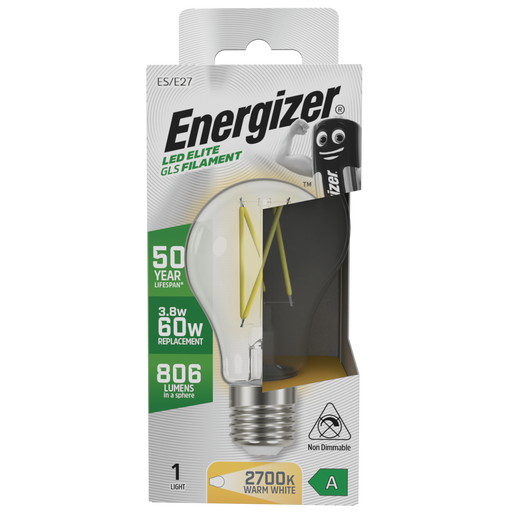
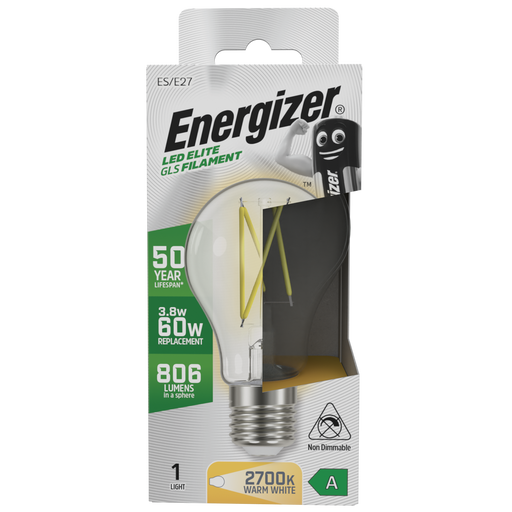
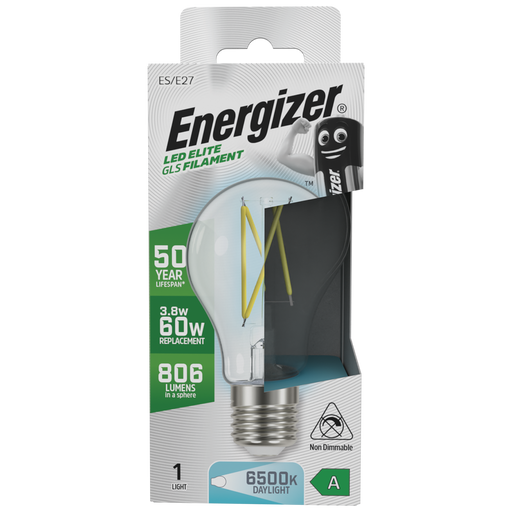

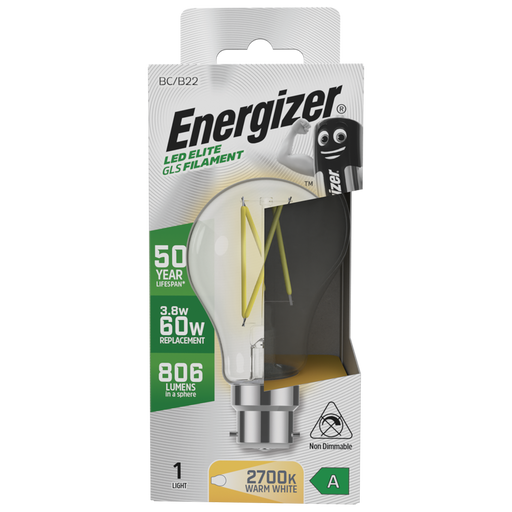

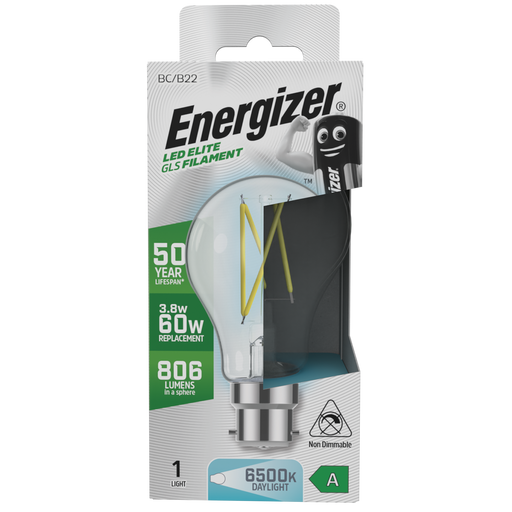

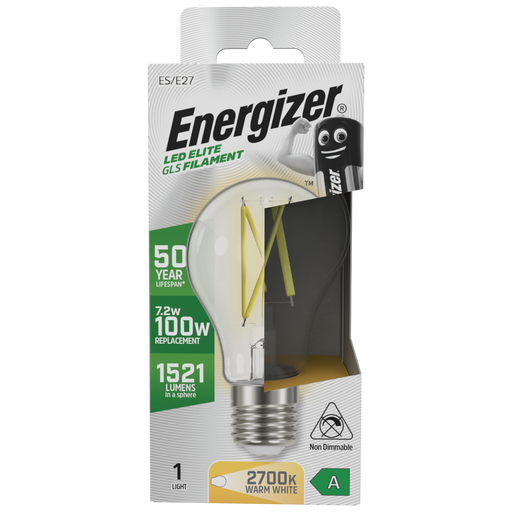

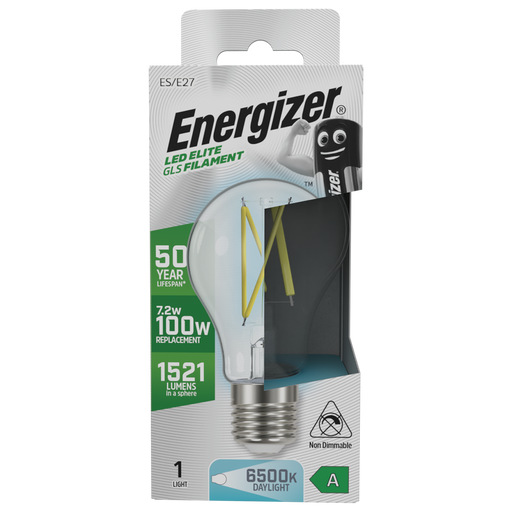

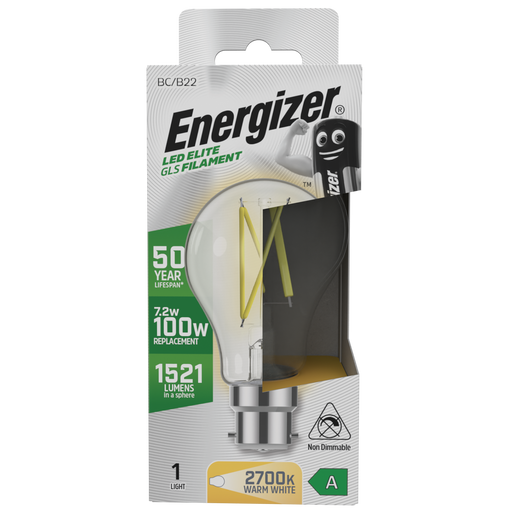
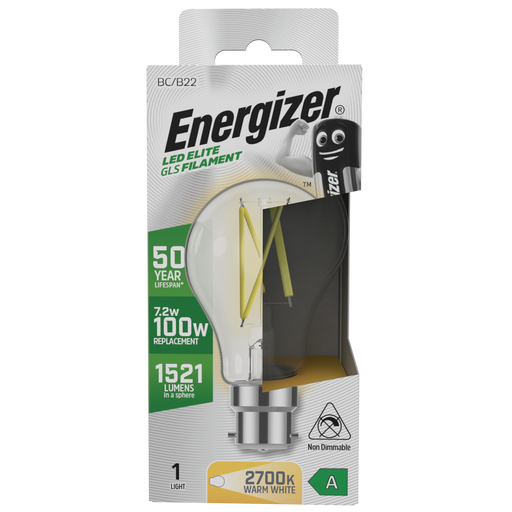
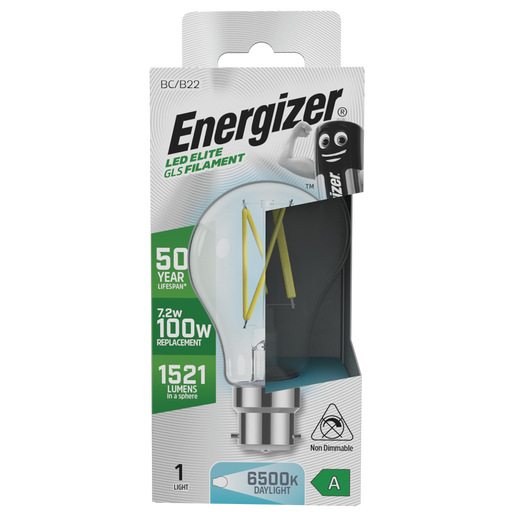
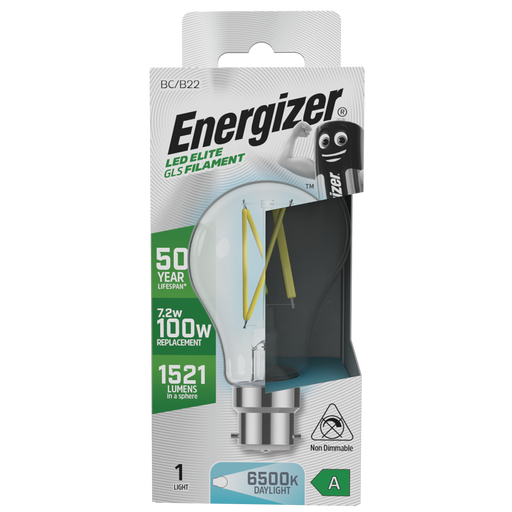
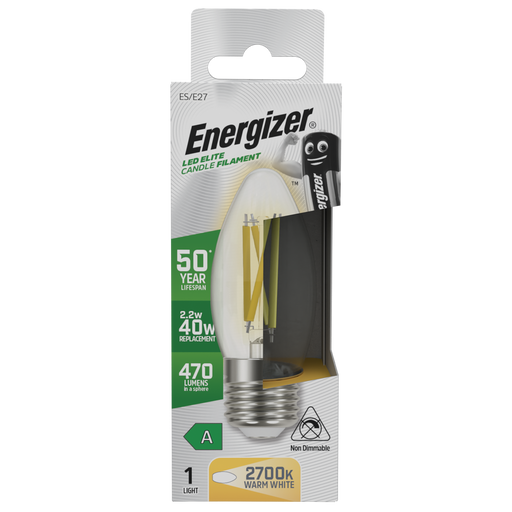
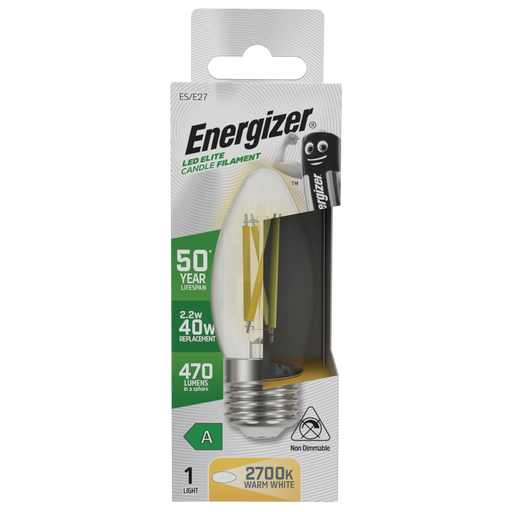
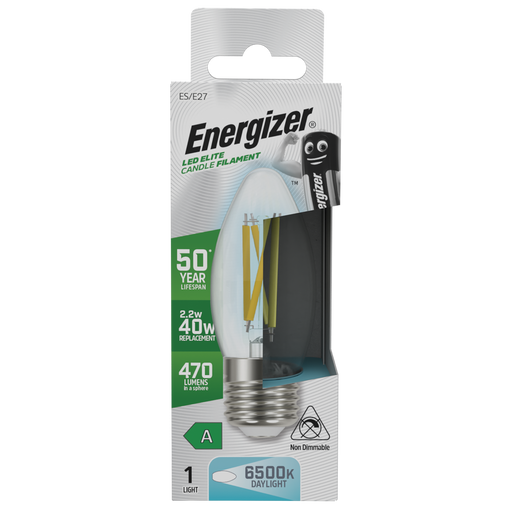
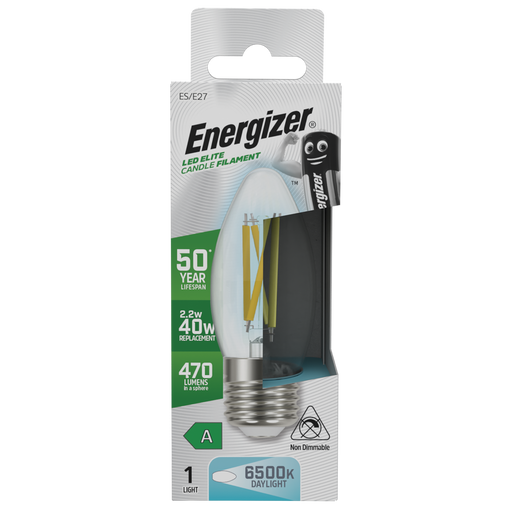
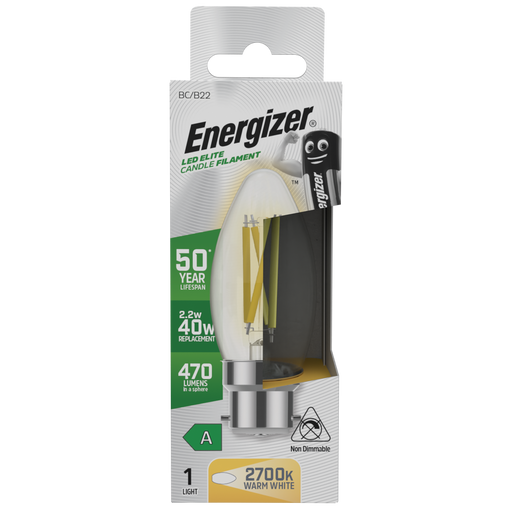
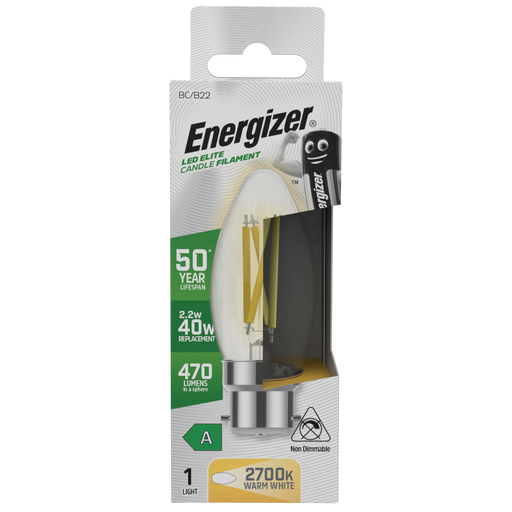
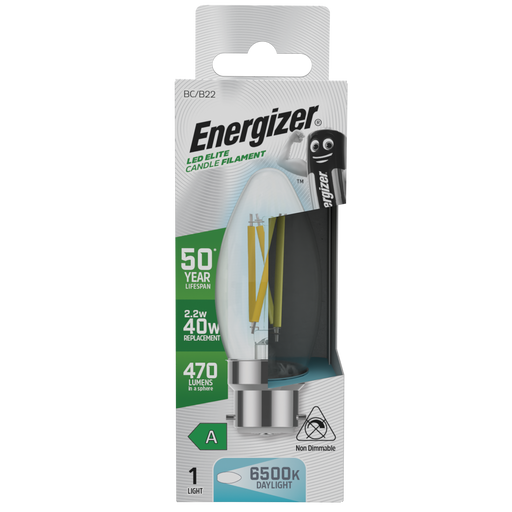
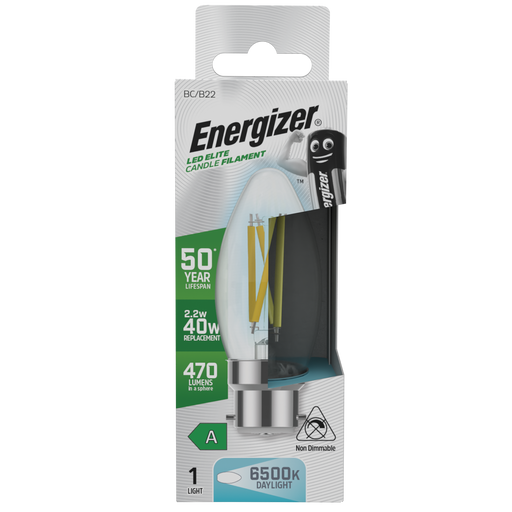
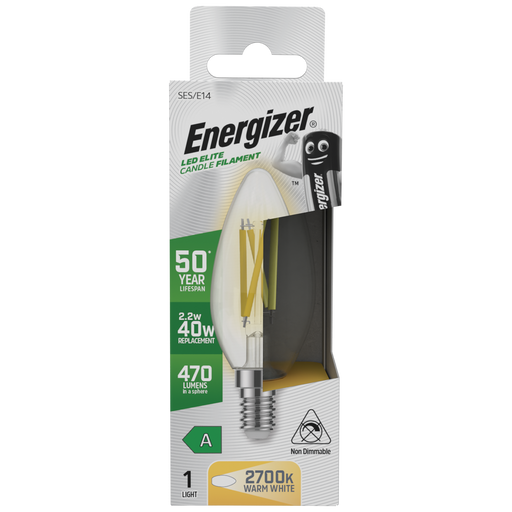
Leave a comment